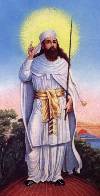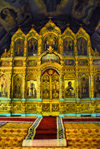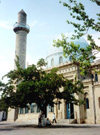| Religion
in Azerbaijan |
Azerb.com
|
 The
prophet Zoroaster (Zarathustra), who was born in the seventh century B.C.
in what is now south Azerbaijan, established a Zoroastrianism,
a religion focused on the cosmic struggle between a supreme god and an
evil spirit. The doctrines preached by Zoroaster are preserved in his metrical
Gathas (psalms), which form part of the sacred scripture known as the Avesta.
It became the state religion of Persia and spread into central Asia.
The
prophet Zoroaster (Zarathustra), who was born in the seventh century B.C.
in what is now south Azerbaijan, established a Zoroastrianism,
a religion focused on the cosmic struggle between a supreme god and an
evil spirit. The doctrines preached by Zoroaster are preserved in his metrical
Gathas (psalms), which form part of the sacred scripture known as the Avesta.
It became the state religion of Persia and spread into central Asia.
Christianity arrived early to the
area, with the mission of St. Eliseus reaching Caucasian Albania in the
1st century AD. By the 3rd century the Apostolic Autocephalous church
was fully established and religious and cultural live was thriving. North
of Araz river (Caucasian Albania or Aluania), Christianity became the main
religion and gained state recognition in the 5th century after St. Grigor
the Illuminator converted and baptized its king, Urnayr.
 But
the cultural and religious influence of Europe had its days counted, as
Islam
arrived in Azerbaijan with Arab invaders in the seventh century A.D., gradually
supplanting Christianity in north Azerbaijan, and Zoroastrianism in the
south, as well as causing the extinction of Azeri pagan cults.
But
the cultural and religious influence of Europe had its days counted, as
Islam
arrived in Azerbaijan with Arab invaders in the seventh century A.D., gradually
supplanting Christianity in north Azerbaijan, and Zoroastrianism in the
south, as well as causing the extinction of Azeri pagan cults.
In the seventh and eighth centuries, many
Zoroastrians fled Muslim persecution and moved to India, where they became
known as Parsis. Until Soviet Bolsheviks ended the practice, Zoroastrian
pilgrims from India and Iran traveled to Azerbaijan to worship at sacred
sites, including the Surakhany Temple on the Apsheron Peninsula near Baku.
 In
the sixteenth century, the first shah of the Safavid Dynasty, Ismail I
(r. 1486-1524), established Shia Islam as the state religion, although
large numbers of Azeris remained followers of the other branch of Islam,
Sunni. The Safavid court was subject to both Turkic (Sunni) and Iranian
(Shia) influences, however, which reinforced the dual nature of Azeri religion
and culture in that period. As elsewhere in the Muslim world, the two branches
of Islam came into conflict in Azerbaijan. Enforcement of Shia Islam as
the state religion brought contention between the Safavid rulers of Azerbaijan
and the ruling Sunnis of the neighboring Ottoman Empire.
In
the sixteenth century, the first shah of the Safavid Dynasty, Ismail I
(r. 1486-1524), established Shia Islam as the state religion, although
large numbers of Azeris remained followers of the other branch of Islam,
Sunni. The Safavid court was subject to both Turkic (Sunni) and Iranian
(Shia) influences, however, which reinforced the dual nature of Azeri religion
and culture in that period. As elsewhere in the Muslim world, the two branches
of Islam came into conflict in Azerbaijan. Enforcement of Shia Islam as
the state religion brought contention between the Safavid rulers of Azerbaijan
and the ruling Sunnis of the neighboring Ottoman Empire.
 In
the nineteenth century, under Russian protection, many Christians settled
in Azerbaijan. These were not only Orthodox Russians, but also Armenians
fleeing the Ottoman empire, and even Protestants like the Molokans. Many
Sunni Muslims emigrated from Russian-controlled Azerbaijan because of Russia's
series of wars with their coreligionists in the Ottoman Empire. Thus, by
the late nineteenth century, the Shia population was in the majority in
Russian Azerbaijan. Antagonism between the Sunnis and the Shia diminished
in the late nineteenth century as Azeri nationalism began to emphasize
a common Turkic heritage and opposition to Iranian religious influences.
At present, about three-quarters of Azeri Muslims are, at least nominally,
Shia
of the Jafarite rite (the main Shia branch). In the 1989 census 87 percent
of the population declared to be Muslim - with the exit of many Russians
and all Armenians this percentage is now above 90%. Data is not available
on the number of Sunnis.
In
the nineteenth century, under Russian protection, many Christians settled
in Azerbaijan. These were not only Orthodox Russians, but also Armenians
fleeing the Ottoman empire, and even Protestants like the Molokans. Many
Sunni Muslims emigrated from Russian-controlled Azerbaijan because of Russia's
series of wars with their coreligionists in the Ottoman Empire. Thus, by
the late nineteenth century, the Shia population was in the majority in
Russian Azerbaijan. Antagonism between the Sunnis and the Shia diminished
in the late nineteenth century as Azeri nationalism began to emphasize
a common Turkic heritage and opposition to Iranian religious influences.
At present, about three-quarters of Azeri Muslims are, at least nominally,
Shia
of the Jafarite rite (the main Shia branch). In the 1989 census 87 percent
of the population declared to be Muslim - with the exit of many Russians
and all Armenians this percentage is now above 90%. Data is not available
on the number of Sunnis.
 Azerbaijan's
next largest official religion is Christianity, represented mainly by Russian
Orthodox and Armenian Apostolic groups. The Jewish
community counts about 16.000 souls. Some rural Azeri retain pre-Islamic
shamanist or animist beliefs, such as the sanctity of certain sites and
the veneration of certain trees and rocks.
Azerbaijan's
next largest official religion is Christianity, represented mainly by Russian
Orthodox and Armenian Apostolic groups. The Jewish
community counts about 16.000 souls. Some rural Azeri retain pre-Islamic
shamanist or animist beliefs, such as the sanctity of certain sites and
the veneration of certain trees and rocks.
Before Soviet power was established, about
2,000 mosques were active in Azerbaijan. Most mosques were closed in the
1930s, then some were allowed to reopen during World War II. In the 1980s,
however, only two large and five smaller mosques held services in Baku,
and only eleven others were operating in the rest of the country. Supplementing
the officially sanctioned mosques were thousands of private houses of prayer
and many secret Islamic sects. Beginning in the late Gorbachev period,
and especially after independence, the number of mosques
rose dramatically. Many were built with the support of other Islamic countries,
such as Iran, Oman,
and Saudi Arabia, which also contributed Qurans and religious instructors
to the new Muslim states. A Muslim seminary has also been established since
1991. As in the other former Soviet Muslim republics, religious observances
in Azerbaijan do not follow all the traditional precepts of Islam. For
example, drinking wine is normal practice, and women are not veiled or
segregated.
 During
World War II, Soviet authorities established the Muslim Spiritual Board
of Transcaucasia in Baku as the governing body of Islam in the Caucasus,
in effect reviving the nineteenthcentury tsarist Muslim Ecclesiastical
Board. During the tenures of Leonid I. Brezhnev and Mikhail S. Gorbachev,
Moscow encouraged Muslim religious leaders in Azerbaijan to visit and host
foreign Muslim leaders, with the goal of advertising the freedom of religion
and superior living conditions reportedly enjoyed by Muslims under Soviet
communism.
During
World War II, Soviet authorities established the Muslim Spiritual Board
of Transcaucasia in Baku as the governing body of Islam in the Caucasus,
in effect reviving the nineteenthcentury tsarist Muslim Ecclesiastical
Board. During the tenures of Leonid I. Brezhnev and Mikhail S. Gorbachev,
Moscow encouraged Muslim religious leaders in Azerbaijan to visit and host
foreign Muslim leaders, with the goal of advertising the freedom of religion
and superior living conditions reportedly enjoyed by Muslims under Soviet
communism.
 In
the early 1980s, Allashukur Humatogly Pashazade was appointed sheikh ul-Islam,
head of the Muslim board. With the breakup of the Soviet Union, the Muslim
board became known as the Supreme Religious Council of the Caucasus Peoples.
In late 1993, the sheikh blessed Heydar Aliyev at his swearing-in ceremony
as president of Azerbaijan.
In
the early 1980s, Allashukur Humatogly Pashazade was appointed sheikh ul-Islam,
head of the Muslim board. With the breakup of the Soviet Union, the Muslim
board became known as the Supreme Religious Council of the Caucasus Peoples.
In late 1993, the sheikh blessed Heydar Aliyev at his swearing-in ceremony
as president of Azerbaijan.
Article 18 of the Azeri constitution,
mandating no state religion, allows for all faiths to practice their religion
freely. Following independence there has been both a Muslim revival and
a rise in nationalism.
(souce: Library of Congress)
| A to Z of Azerbaijan
/ A dan Z ye Azerbaycan |
www.azerb.com
|
 But
the cultural and religious influence of Europe had its days counted, as
Islam
arrived in Azerbaijan with Arab invaders in the seventh century A.D., gradually
supplanting Christianity in north Azerbaijan, and Zoroastrianism in the
south, as well as causing the extinction of Azeri pagan cults.
But
the cultural and religious influence of Europe had its days counted, as
Islam
arrived in Azerbaijan with Arab invaders in the seventh century A.D., gradually
supplanting Christianity in north Azerbaijan, and Zoroastrianism in the
south, as well as causing the extinction of Azeri pagan cults.
 The
prophet Zoroaster (Zarathustra), who was born in the seventh century B.C.
in what is now south Azerbaijan, established a Zoroastrianism,
a religion focused on the cosmic struggle between a supreme god and an
evil spirit. The doctrines preached by Zoroaster are preserved in his metrical
Gathas (psalms), which form part of the sacred scripture known as the Avesta.
It became the state religion of Persia and spread into central Asia.
The
prophet Zoroaster (Zarathustra), who was born in the seventh century B.C.
in what is now south Azerbaijan, established a Zoroastrianism,
a religion focused on the cosmic struggle between a supreme god and an
evil spirit. The doctrines preached by Zoroaster are preserved in his metrical
Gathas (psalms), which form part of the sacred scripture known as the Avesta.
It became the state religion of Persia and spread into central Asia.

 In
the nineteenth century, under Russian protection, many Christians settled
in Azerbaijan. These were not only Orthodox Russians, but also Armenians
fleeing the Ottoman empire, and even Protestants like the Molokans. Many
Sunni Muslims emigrated from Russian-controlled Azerbaijan because of Russia's
series of wars with their coreligionists in the Ottoman Empire. Thus, by
the late nineteenth century, the Shia population was in the majority in
Russian Azerbaijan. Antagonism between the Sunnis and the Shia diminished
in the late nineteenth century as Azeri nationalism began to emphasize
a common Turkic heritage and opposition to Iranian religious influences.
At present, about three-quarters of Azeri Muslims are, at least nominally,
Shia
of the Jafarite rite (the main Shia branch). In the 1989 census 87 percent
of the population declared to be Muslim - with the exit of many Russians
and all Armenians this percentage is now above 90%. Data is not available
on the number of Sunnis.
In
the nineteenth century, under Russian protection, many Christians settled
in Azerbaijan. These were not only Orthodox Russians, but also Armenians
fleeing the Ottoman empire, and even Protestants like the Molokans. Many
Sunni Muslims emigrated from Russian-controlled Azerbaijan because of Russia's
series of wars with their coreligionists in the Ottoman Empire. Thus, by
the late nineteenth century, the Shia population was in the majority in
Russian Azerbaijan. Antagonism between the Sunnis and the Shia diminished
in the late nineteenth century as Azeri nationalism began to emphasize
a common Turkic heritage and opposition to Iranian religious influences.
At present, about three-quarters of Azeri Muslims are, at least nominally,
Shia
of the Jafarite rite (the main Shia branch). In the 1989 census 87 percent
of the population declared to be Muslim - with the exit of many Russians
and all Armenians this percentage is now above 90%. Data is not available
on the number of Sunnis.
 Azerbaijan's
next largest official religion is Christianity, represented mainly by Russian
Orthodox and Armenian Apostolic groups. The
Azerbaijan's
next largest official religion is Christianity, represented mainly by Russian
Orthodox and Armenian Apostolic groups. The 
